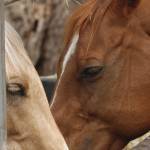What Do Horse Owners Know About Equine Nutrition?

Based on a recent survey*, researchers from the United Kingdom and Australia suggest that horse owners have a working knowledge of equine nutrition but more information regarding body condition score (BCS) and specific nutrition-related disorders should be available to them.
This conclusion was drawn after surveying 19,000 horse owners who participated in an online equine nutrition course. Of those, 6,538 participants subsequently completed a survey to assess their knowledge of equine nutrition. The survey collected general information (including age, gender, time involved in the equine industry, and number of horses owned) as well as specifics, such as amount and type of fiber, concentrates, and supplements fed, how feed was offered, how they determined their horses’ weight, and where they obtained their nutrition education.
Key findings of the study were:
- Most participants of the online equine nutrition course and survey respondents were females that had been involved in the equine industry from less than one year to more than 25 years;
- Most participants were the primary caretaker for their own horses and were therefore responsible for making decisions regarding their horses’ diets;
- Approximately 70% of respondents indicated their horses had some access to pasture and 87% fed concentrates;
- Only 60% monitored their horses’ body weights, usually about once a month with a weight tape;
- Less than half of respondents used BCS to monitor body weight;
- Owners were most interested in nutritional management of hoof and joint conditions, colic, and senior horses.
Survey results indicate the participants’ knowledge of many facets of equine nutrition was average, whereas understanding of the nutritional aspects of these specific conditions was below average or even poor:
- Insulin resistance;
- Equine Cushing’s disease;
- Equine metabolic syndrome;
- Tying-up;
- Equine gastric ulcer syndrome;
- Recurrent airway obstruction;
- Polysaccharide storage myopathy; and
- Hyperkalemic periodic paralysis.
“One particularly interesting feature of this study pointed out by the study authors was the fact that over half of the survey respondents did not use BCS, which is known to be one of the most useful tools for weight management. Further, despite being widely discussed online, 10% of the respondents did not know what a BCS was,” said Bryan Waldridge, D.V.M., head veterinarian for Kentucky Equine Research.
This study highlights the fact that more information on BCS and dietary management of specific conditions needs to be disseminated to horse owners, and, importantly, that owners want to have access to such information.
*Murray, J.D., C. Bloxham, J. Kulifay, et al. 2015. Equine nutrition: a survey of perceptions and practices of horse owners undertaking a massive open online course in equine nutrition. Journal of Equine Veterinary Science. In press.








